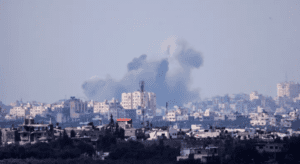Unprecedented Destruction in Gaza: Examining Israel’s Intense Military Campaign Amidst 21st Century Conflicts

The ongoing conflict between Israel and Gaza has recently escalated to unprecedented levels, with Israel’s intense military campaign drawing attention for the sheer magnitude of destruction witnessed. As the world witnesses the grim realities unfolding in the region, it becomes imperative to analyze the intensity of Israel’s military actions and their implications in the context of 21st-century conflicts.
The recent clashes erupted over longstanding geopolitical tensions and escalated rapidly, leading to a surge in violence and a distressing humanitarian crisis. The scale of destruction witnessed in Gaza has raised eyebrows, with experts noting that Israel’s military campaign has surpassed the magnitude of conflicts witnessed in the 21st century.
One of the key factors contributing to the unprecedented nature of the destruction is the advanced military capabilities employed by Israel. The use of precision airstrikes and technologically sophisticated weaponry has resulted in severe damage to infrastructure, residential areas, and essential facilities in Gaza. The precision with which these strikes are executed, while aiming to target militant strongholds, inevitably results in collateral damage to civilian structures, exacerbating the human toll.
The international community has expressed concern over the disproportionate use of force, emphasizing the need for a nuanced and measured approach in addressing the underlying issues. The toll on civilian lives, including women and children, has been devastating, prompting widespread calls for an immediate ceasefire and diplomatic resolution.
In the realm of 21st-century conflicts, the role of technology in modern warfare has become increasingly prominent. Israel’s military campaign in Gaza underscores the evolving nature of armed conflicts, where precision-guided missiles and advanced surveillance technologies play a central role. The integration of cutting-edge weaponry has far-reaching consequences, both in terms of the immediate destruction witnessed and the long-term implications for the affected region.
Moreover, the intense media coverage and real-time dissemination of information have amplified the global awareness of the destruction in Gaza. Social media platforms serve as conduits for firsthand accounts, images, and videos, providing the world with an unfiltered view of the consequences of the conflict. The instantaneous and widespread sharing of information has spurred international outcry, leading to protests, diplomatic interventions, and increased pressure on both parties to seek a peaceful resolution.
The humanitarian impact of Israel’s military campaign cannot be overstated. The destruction of critical infrastructure, including hospitals, schools, and water facilities, exacerbates the already dire living conditions in Gaza. The displacement of thousands of civilians adds to the complexity of the crisis, with overcrowded shelters and limited access to basic necessities further intensifying the suffering of the population.
The complexity of the Israel-Gaza conflict extends beyond the immediate military engagements. Rooted in historical grievances, territorial disputes, and geopolitical complexities, the conflict defies easy resolution. The intensity of Israel’s military campaign is not only a result of the immediate provocations but also reflective of deep-rooted tensions that demand a comprehensive and sustained effort towards a lasting solution.
As the international community grapples with the implications of the conflict, diplomatic efforts to broker a ceasefire and facilitate dialogue have gained momentum. The United Nations, regional actors, and global leaders are actively engaged in pushing for de-escalation and a return to negotiations. The urgency of addressing the underlying causes of the conflict is underscored by the scale of destruction and the humanitarian crisis unfolding in Gaza.
In conclusion, Israel’s intense military campaign in Gaza has brought to the forefront the evolving nature of armed conflicts in the 21st century. The use of advanced weaponry, the instantaneous dissemination of information through digital platforms, and the humanitarian fallout highlight the need for a recalibration of global responses to such crises. As the world grapples with the aftermath of unprecedented destruction, there is a pressing need for sustained diplomatic efforts, international cooperation, and a commitment to addressing the root causes of the Israel-Gaza conflict to ensure a lasting and just resolution.
Also Read : Pro-Palestinian Protesters Disrupt Michigan Democrats’ Holiday Event, Sparking Confrontation